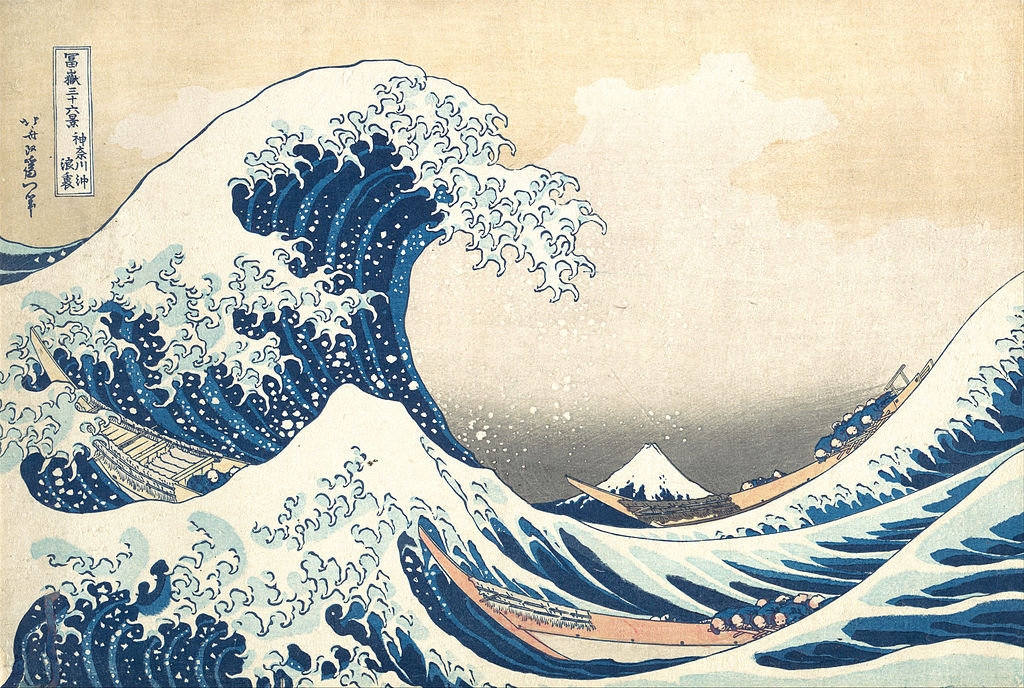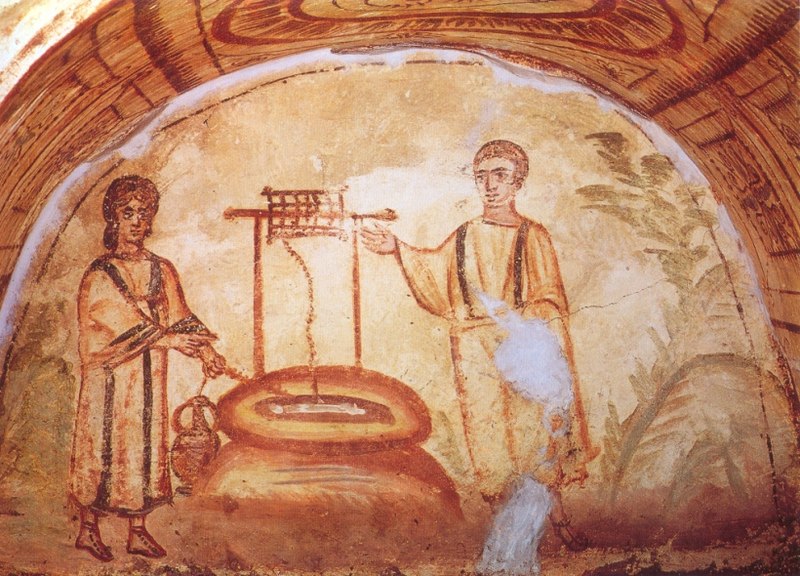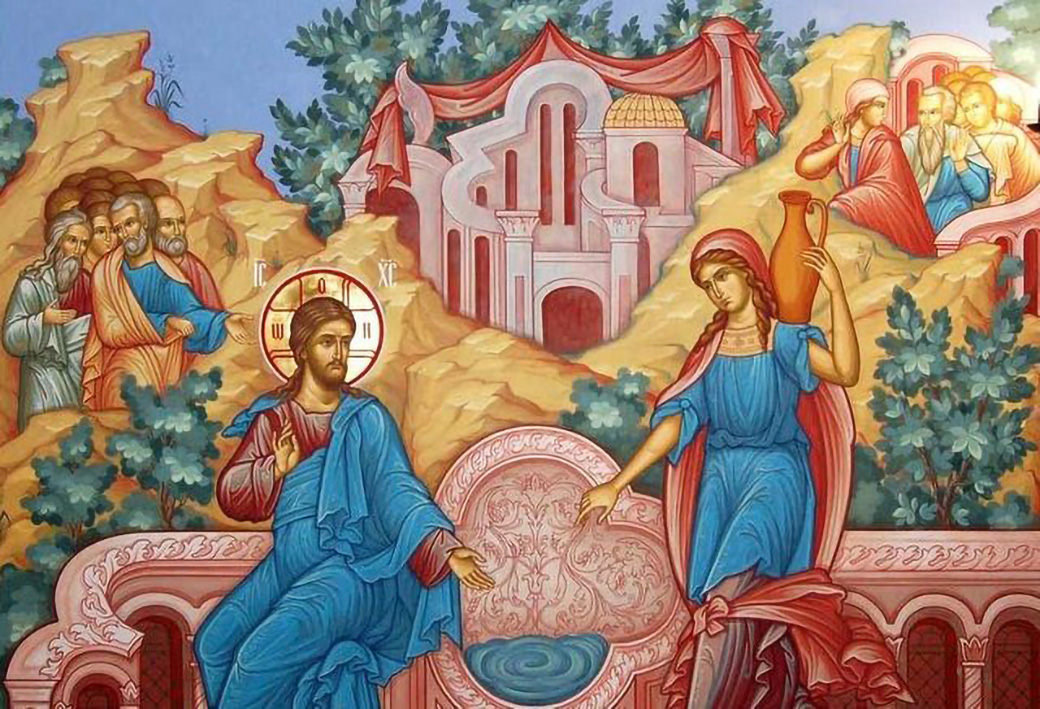Third Sunday in Lent: Exodus 17:3-7, Romans 5:1-2, 5-8, John 4:5-42.
Today’s readings map the importance of water not just as a lifeforce for our physical bodies, but as a symbol of the spiritual nourishment provided by God. We are given two seminal scriptural stories: Moses striking the rock at Massah and Meribah to let forth water and Jesus revealing his gift of “living water” to the Samaritan woman at the well. Both episodes underscore the way our bodily and spiritual needs intertwine in our faith.
The first question we might ask is, why water? It’s so mundane. Yes, we rely on it to live, our bodies consist mostly of water, but why would it be associated with holiness? Why is it used for baptism in Christ?

Our early Church Father Tertullian (c.155 AD – c.240 AD) speaks movingly about the fact that water was present early in creation. In his treatise On Baptism, he recalls the first sentence from the Book of Genesis, where the earth is a formless void and “the Spirit of the Lord was hovering over the waters.” Tertullian writes:
The first thing, O man, which you have to venerate, is the age of the waters in that their substance is ancient; the second, their dignity, in that they were the seat of the Divine Spirit, more pleasing to Him, no doubt, than all the other than existing elements. For the darkness was total thus far, shapeless, without the ornament of stars; and the abyss gloomy; and the earth unfurnished; and the heaven unwrought: water alone — always a perfect, gladsome, simple material substance, pure in itself — supplied a worthy vehicle to God. What of the fact that waters were in some way the regulating powers by which the disposition of the world thenceforward was constituted by God?
Thus, Tertullian demonstrates how water is ancient, dignified, pleasing to the Holy Spirit, pure, and was instrumental for God when forming the rest of Creation. Due to this intimate relationship with the Spirit, all waters, he says, “attain the sacramental power of sanctification; for the Spirit immediately supervenes from the heavens, and rests over the waters, sanctifying them from Himself.” And just as water washes the dirt from our skin, it washes the spiritual stain of sin from our souls.
Water figures mightily in the Exodus story. It is the saving agent for the Israelites and the humbling force against Pharaoh’s army when God parts the sea as Moses raises his staff. And in today’s reading, we hear of the famous place with a double name, Massah and Meribah, which is invoked every day in the Liturgy of the Hours with the invitatory from Psalm 95. “The place was called Massah and Meribah, because the Israelites quarreled there and tested the LORD, saying, ‘Is the LORD in our midst or not?'” God has already delivered them from the hands of Pharaoh, he has given them manna and quail to eat, and so their doubt displeases Him so much that he declares the entire generation will have to wander the desert for 40 years and only the next generation will see the promised land.

The passage opens with an important statement that we should not overlook. It reads, “In those days, in their thirst for water, the people grumbled against Moses …” Thirst for water is answered by God, and is forever associated with faith, or lack of faith. When they thirst for water, they are also thirsting for reassurance, for deliverance. Faith in God is what will bring them both of these, and because they grumble and revolt against Moses instead of staying strong in faith, God makes them an example for the rest of our salvation history. He delivers water to us, but we must wait 1500 years before Christ makes it clear what type of water God provides.
The second reading from St. Paul to the Romans contains a crucial phrase that connects Massah and Meribah to the Samaritan Woman at the Well. Referring to Christ’s death and Resurrection, St. Paul writes, “the love of God has been poured out into our hearts through the Holy Spirit.” All three Persons of the Trinity are present in this concise statement, and the verb is “pour.” God’s unfathomable love is being poured into our hearts. Here we get to the core of what Jesus will refer to as “living water.”
Before diving into the gospel reading, let’s think about wells for a moment. Wells are our way of digging deep for the water God has planted in the earth in the form of natural springs. We are reaching out to God’s providence when we dig wells. We are displaying a primordial faith in our Creator who provides for us. Also, we dig wells when we want to settle in a place for a period of time. Wells, therefore, represent a stable relationship between ourselves and the wonders of Creation that God has given to help support us.
In his incredible book Wellspring of Worship, Jean Corbon, OP, explores the fundamental symbolism of water as he describes the mystical wellspring of worship that is the liturgy. He writes: “Men thirst and look for water wherever they think they will find it. As they wander without any horizon in sight and no way of escape, they dig a well each time they pitch their tent. … Nor does he sleep who placed in the human soul both the thirst and the expectation. Indeed, he is the first to thirst and set out in search of us, to the point of joining us beside our pathetic wells.” Corbon paints a picture of dependence on the part of humanity and something of a tavern owner in God (to borrow one of my favorite images of God from Simon Tugwell). God the tavern keeper, offering us the most satisfying drink, has planted the thirst in us and is also the one who fulfills the thirst.
As we see at Massah and Meribah, thirst is physical and spiritual. The Catechism of the Catholic Church affirms this: “Whether we realize it or not, prayer is the encounter of God’s thirst with ours. God thirsts that we may thirst for him” (2560). Thirst, therefore, defines our mutual relationship with God. And thirst is the thing that brings Jesus and the Samaritan woman together at the well in the noonday heat.

Note, in fact, who asks for water first in our gospel reading: it is Jesus. The Lord thirsts for us — what a remarkable thing! The source of life, beauty and truth, perfect in Himself without any needs … thirsts for an authentic and pure relationship with us! If you haven’t considered this before, realize that this sets our religion and our God apart from all other gods and all other religions.
The Samaritan woman is certainly struck by Jesus’s request. Everyone — Jews and Gentiles alike — was surprised by his opening of the New Covenant to all peoples on earth. Her surprised words, “How can you, a Jew, ask me, a Samaritan woman, for a drink?” are met with what seems like one of the great wry understatements in all of the gospels: “If you knew the gift of God and who is saying to you, ‘Give me a drink,’ you would have asked him and he would have given you living water.” Of course, it’s not wry or an understatement, but the honest truth that he gives her in their moment of mutual thirst.
She doesn’t quite understand what he’s saying, so he elaborates: “the water I shall give will become in him a spring of water welling up to eternal life.” As with every word of this passage, so much depth inhabits these words. Jesus is proclaiming the significance of the New Covenant, that his water (the love he will pour out onto humanity with his death and Resurrection) will become a spring for us that wells up to eternal life. A spring is self-regenerating, and let us realize that the self-regenerating aspect of Christianity is the active work of Christ’s Spirit, renewing us in the liturgy and the sacraments. Furthermore, the goal of this water is not physical life but eternal life. Jesus establishes a new goal, a new end-game that we are able to experience thanks to Him.
The Samaritan woman exclaims that she would love to have this water, “so that I may not be thirsty or have to keep coming here to draw water.” She doesn’t quite get it. She still thinks this is about her physical needs (and psychological, since having to keep coming there in the midday sun to avoid the sneers of the more upstanding women of the community would certainly mean psychological stress). So she responds to God’s thirst with her own thirst, but in order to purify her thirst and point it towards her spiritual needs, not just her physical ones, God tests her.

He tells her to get her husband. Certainly a moment of soul-searching for her, she decides to speak the truth and tell him about her unmarried state. Without scorn or harsh judgment, Jesus affirms her statement and details her life of sin to that point. Our lesson here is twofold: we must recognize and atone for our sins in order to begin a correct relationship with God, and God demands truth in our relationship. Because she meets Him in truth, the remainder of their conversation is startling in its revelation.
Jesus proclaims to her, the outcast and sinner who is thirsty for Him and honest with Him:
But the hour is coming, and is now here,
when true worshipers will worship the Father in Spirit and truth;
and indeed the Father seeks such people to worship him.
God is Spirit, and those who worship him
must worship in Spirit and truth.
Worshipping in Spirit and truth. This is what the Father thirsts for because he “is Spirit” and we meet Him “in Spirit and truth.” It is the activity of our souls, not the activity of our bodies in a certain place (like the mountain or Jerusalem). It is the work of intent and heart, not of bodies and outward ritual.
Jesus reiterates this point when his disciples ask him if he wants to eat and he responds, “I have food to eat of which you do not know. … My food is to do the will of the one who sent me and to finish his work.” To finish his work! The work of Creation started by God will be finished, refined in the fire of the sacrifice, to purify humanity and make them finally ready to unite with God on the spiritual level for which he always intended.
But before this exchange with the disciples, he makes the most shocking statement in private to the Samaritan woman, acknowledging, “I am he [the Messiah], the one speaking with you.” How can we reconcile this revelation of his identity when he spends much of the gospels asking people not to talk about him as the Messiah and not fully proclaiming it until the time just before his Passion in Jerusalem? How else except to understand this encounter as the prototype for all relationships with God: when we meet Him personally, in truth, honestly thirsting for Him, then He will share with us all of his glory and revelation. She is the archetype of the sinner who converts in honesty, is baptized in water of the Spirit, and enjoys an honest and blessed existence close to God.

There is so much to say here: how the townspeople experience this conversion themselves (“We no longer believe because of your word; for we have heard for ourselves, and we know that this is truly the savior of the world.”), how the well is Jacob’s well and Christ is the Anointed One, greater than the prior prophets and figures in the scriptures and instilling a new meaning on water and the well, etc. But, I’ve gone on long enough.
One last thing to mention that brings us back to St. Paul’s words in the second reading, “the love of God has been poured out into our hearts through the Holy Spirit.” The living water that Christ brings to the Samaritan Woman at the well is the very same “love of God” St. Paul writes about. That’s why Paul speaks of it as being “poured out.”
Corbon gives us a lovely way to connect water with the love of God:
In the communion of the Blessed Trinity … we find life in its eternal outpouring; the river of life, which John contemplates at the heart of history, is an energy of love at work before the world was. … Yes, the mysterious river of divine communion is an outpouring of love among the Three, and in it eternal life consists. Each person is gift and acceptance of gift. … The river is love, but a love that does not arise in the human heart. The river is life, but a life that does not flow from the human heart. That is because this river, this energy, is wholly other; it is the self-opening of our thrice-holy God.
This is the theology of the Trinity: not just three Persons contained in one God, but three Persons endlessly pouring out their love among one another. Here is the river of life, the river of love, the wellspring of worship: it is located in the “self-opening of our thrice-holy God.” That is why Christ experienced the Passion, death, and Resurrection. He shared with us this self-sacrificing quality of the Trinity; more than shared, he poured upon all of history the river of love that is the fundamental action of the Trinity. THIS is his living water, of which he tells the Samaritan woman, “If you knew the gift of God …”
If you knew the gift, indeed!

Pingback: A Prophet in his Own Land is never accepted
Pingback: Agape Has Only One Source: God
Pingback: Water from the Temple is the Divine Love
Pingback: The Generous Harvest Without Cost